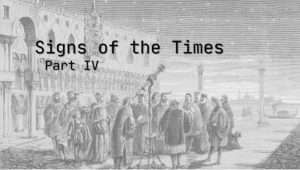Introduction:
There is an assumption that has become common among many Christian circles that the subject of abortion is neither addressed by, nor mentioned in, the Scriptures. This assumption is then used as an argument justifying support for abortion. The problem with this assumption is trifold.
The first part of the problem is that of translation. The term “abortion” would, quite naturally, not have been directly used by the biblical writers because it is a modern English term. If an argument against the biblical prohibition of abortion rests on the term not being present in the Scriptures, then the same argument could be made in defense of the consumption of pornography. That English term is never directly used either. Yet most reasonable Christians would agree that pornography falls under the categories of sexual immorality, lust, and perversion.
The second part of the problem is that of context. This goes hand-in-hand with the translation problem. Words and phrases have cultural meaning. If the culture in question is ancient, then the words and phrases specific to that culture also have historical meaning. In order to find the correct and intended meaning of a word or phrase, its cultural-historical context must be taken into interpretative account. Otherwise, the interpretation arrived at will be one that is foreign to both the historical-contextual meaning of the word or phrase, and the intent behind its specific use.
The third part of the problem —and perhaps the most pertinent— is that of reasoning. Specifically, the reasoning behind both the acceptance of the assumption and the regurgitation of it. A professing Christian’s assumption that the Scriptures have nothing to say regarding abortion, that it is a “gray” issue, has nothing to do with the term’s scriptural absence.
Rather, it is indicative of reasoning that is philosophically and politically motivated; reasoning that necessitates the issue be turned from ‘black & white’ to gray. This tainted reasoning not only prevents its advocate from seeing anything outside its confines, but also assumes that those who disagree with it are similarly motivated. It is difficult to persuade someone entrenched in such a line of reasoning to leave it, let alone come up for air.
Here’s What The Bible Says
Be that as it may, the question remains: What does the Bible say about abortion?
The answer: More than most Christians assume.
To begin with, let’s consider a study done by Dr. Scott Morschauser on Exodus 1:16. A summary of Dr. Morschauser’s work shows that a prenatal exam and an abortion is what Pharaoh initially ordered the Hebrew midwives to conduct; made evident from the use of the phrase “upon the potter’s wheel.” This phrase was used when describing the development of a child in utero in the ancient Egyptian context. Until recently, this phrase has been mistranslated.
Deep, But Worth The Dive
–POTTERS’ WHEELS AND PREGNANCIES: A NOTE ON EXODUS 1:16
“The beginning of the exodus story recounts a change of leadership in Egypt. A new king who “did not know Joseph” implements a program of oppression against the descendants of Jacob. Dissatisfied with the results of his policy of forced labor, the unnamed sovereign decides to treat the Israelites with further malevolence. Summoning the “midwives” Shiphrah and Puah, he announces his sinister intention: “When you serve as midwives to the Hebrew women, and see them upon the birthstool, if it is a son, you shall kill him; but if it is a daughter, she shall live” (-Exodus 1:16 RSV).
A perusal of modern versions will indicate that the previous rendering is widely accepted. Despite such agreement, a number of problems remain unresolved. The term ָא ְב ָנ ִים [ōḇen] of the MT has been a crux, although the suggestion that it refers to some sort of obstetric aid has long pedigree. Moreover, some translators have regarded the phrase ְר ִאי ֶתן ַעל־ ָה ָא ְב ָנ ִים וּ [rā’â ‘al ōḇen]. To make sense of the passage, the need was felt to supply a pronoun referring back to the supposed antecedent ָה ִע ְבִריּוֹת: “when you see <them> (the Hebrew women) upon the ‘birthstool’…”
Although this interpretation is tempting, questions arise concerning the accuracy of such a proposal, especially in light of the immediate sequel. As is well known, the female personnel do not follow the decree (Exodus 1:17b). When news of the women’s failure reaches the king, he demands an explanation for their negligence, to which Shiphrah and Puah make the duplicitous reply: “… the Hebrew women … are delivered before the midwife comes to them …” (Exodus 1:19). Surprisingly, given the portrait that has been drawn of this monarch, the answer is wholly satisfactory to the pharaoh, insofar as the two women escape punishment.
But why would either a premature or unattended birth annul the main thrust of the royal command? If one accepts the usual interpretations of v. 16, the excuse offered by Shiphrah and Puah would not have solved their dilemma. The absence of a midwife would hardly have freed the women from their duty to their sovereign: they still would have the information necessary to carry out their task. However, the next stage in this process, wherein the ruler ratchets up the pressure and demands that his subjects drown the Hebrew infants, makes it probable that the midwives’ mission had been formulated in a different fashion. Apparently, their order had been to eliminate the males prior to their birth, but once delivered, they were to be permitted to survive. This raises the possibility that both the translation and exegesis of v. 16 are in need of revision.
A possible solution may be furnished by positing that an “Egyptianism” underlies the phrase ָה ָא ְב ָנ ִים ַעל [‘al ōḇen].
To an extent, this vignette’s focus on the midwives reflects some familiarity with Egyptian culture, particularly the renown it had throughout the ancient world in the field of gynecological practice. The attempts to see in ָָא ְב ָנ ִים [ōḇen] a birthing device were largely shaped by suppositions about obstetric techniques from the Nile Valley. By the same token, while the use of “bricks” or “stools” in labor is sometimes attested, Jeremiah 18:3 demonstrates that ָא ְב ָנ ִים [ōḇen] can only refer to a “potter’s wheel”: “I went down to the potter’s house, and behold, he was doing work upon the wheel (ַעל־ ָה ָא ְב ָנ ִים)”. The phrase is exactly the same as in Exod 1:16. The recognition that women likely did not bear offspring on such a contraption led to the attempts to explain the term as something other than what it was.
Yet the “potter’s wheel” is regularly linked to pregnancy in ancient Egyptian religious literature and art. The implement (Eg. nḥp/nḥb) was associated with the creator-god, Khnum, a ram-headed deity who was depicted as an artisan. In mythopoetic texts, Khnum would mold and shape each human being at conception “upon his wheel,” with the potential child being granted the physical and psychological traits that would define it as an individual—obviously including characteristics of gender. During this time of fashioning, the developing infant was said to be “upon the potter’s wheel” (ḥr nḥp), from which it would hopefully be delivered hale and healthy. What is significant, is that the metaphor refers to a gestating fetus prior to parturition.
We suggest that the Hebrew is an adaptation of the idiom ḥr nḥp and refers to a child still forming in the womb that has not yet come to full term. Grammatically, ַעל־ ָה ָא ְב ָנ ִים [‘al ōḇen] is most likely an example of casus pendens, or anticipatory emphasis. The prepositional phrase has been moved forward to stress the circumstances surrounding the time of the midwives’ examination (ְר ִאי ֶתםוּ): “When you look/determine ‘upon the potter’s wheel’ [i.e., when you undertake a prenatal examination], if it is a son, then terminate him; if it is a daughter, she shall live.” Such a procedure would have been within the scope of ancient Egyptian knowledge and practice. Medical texts contain prognostic recipes for determining the sex of an unborn child, as well as prescriptions for ending a pregnancy through draughts and potions.
Within the narrative logic and progression of Exodus, the royal injunction of Exod 1:16 should thus be understood as an intermediate measure in a campaign of increasing violence against the Israelites. The demand for the elimination of unborn males stands midway between the rigors of the corvée initially inflicted upon the adult community of Israel and the subsequent command to the Egyptian populace to commit outright infanticide.”
—Dr. Scott Morschauser –Journal of Biblical Literature 122 (2003)
To Reiterate
Again, it must be reiterated that the assumption that an explicit reference to the English term “abortion” in the Scriptures is required for a biblical case against it to be valid is both illogical and unreasonable.
With this in mind, it ought to be evident that the orders given to the Hebrew midwives to administer abortifacients are part of the issue the writer of Exodus is addressing. This is clear from both the emphasis placed on the midwives’ refusal to do so and the emphasis on the evil of Pharaoh’s commands.
“But the midwives feared God, and they did not do as the king of Egypt had said to them. They let the boys live.” -Exodus 1:17 [LEB]
God’s Morel Code Of Ethics
If abortion was not something the God of Israel took issue with, then what Pharaoh ordered the midwives to do should not have been a problem, as it would not have been a violation of His moral code or ethics. After all (abortion advocates would say), science dictates that, “It’s just a clump of cells”. If that is the case, Pharaoh’s initial command, while driven by fear, was dictatorial or tyrannical but not infanticidal (a clump of cells can’t be murdered).
What else ought to be clear is that the use of abortifacients was not a violation of the Egyptian pantheons and/or governments moral code or ethics. Pharaoh was obviously well enough aware of the effects of these potions and/or draughts to give such a command. This evidence suggests that abortion was a common practice in ancient Egypt.
Conclusion
While we would presume most professing Christians would recognize the evil of national infanticide, what ought to now be evident is that the preliminary attempt at it by Pharoah via abortion was both addressed by and mentioned in the Scriptures. And, thanks to the insights given by some cultural-historical context, it was addressed directly.
As such, we have found that the common assumption among many Christian circles, that the subject of abortion is neither addressed by, nor mentioned in, the Scriptures, is biblically and factually inaccurate.
The truth just got lost in translation.


